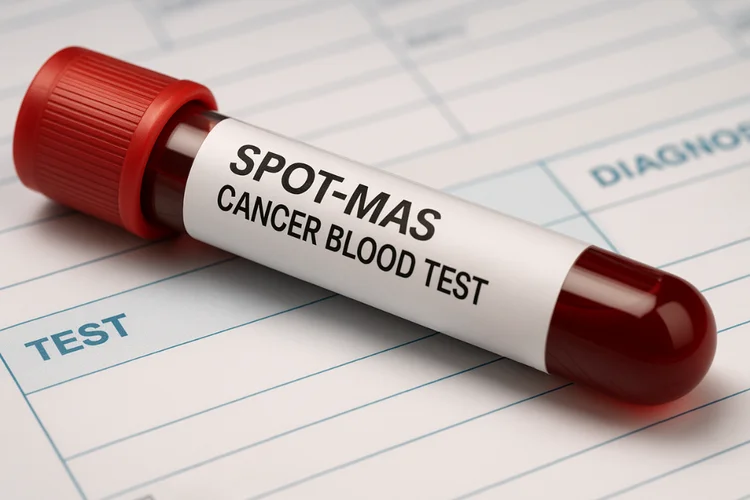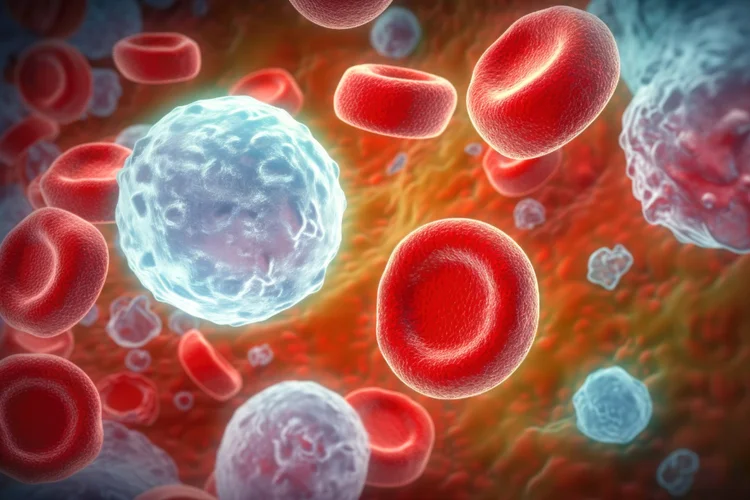SPOT-MAS™ Cancer Blood Test
Last updated: Feb 26, 2026
| Test Name | SPOT-MAS™ Cancer Blood Test |
| Purpose | Detects early cancer signals across 10 organ systems and 75 cancer subtypes by analysing circulating tumour DNA (ctDNA) using next-generation sequencing and artificial intelligence. |
| Recommended For | Adults aged 40 and above, or individuals at higher risk of cancer due to factors such as family history, chronic liver disease, smoking, or genetic predisposition. |
| Price | $788 NETT and inclusive of GST |
| Appointment Options |
Same-day appointment (subject to availability). Book via WhatsApp: 88750352 or email: camden@atamed.sg |
| Clinic Locations |
Orchard: 1 Orchard Blvd
#05-09 Camden Medical Centre, S248649 Tanjong Pagar: 72 Anson Rd #01-02 Anson House, S079911 Jurong: 21 Jurong Gateway Rd, #02-08 CPF Jurong Building, S608546 |
What Is the SPOT-MAS Cancer Blood Test?
Developed by Gene Solutions, the SPOT-MAS
Multi-Cancer Early Detection Blood Test is a multi-cancer early detection (MCED)
screening that identifies DNA fragments shed by tumour cells, to detect
potential signs of cancer from a single blood sample.
By utilising advanced genetic sequencing and artificial intelligence (AI), SPOT-MAS can
detect early signs of cancer across 10 organ systems and 75 cancer subtypes,
including those that do not have existing routine screening programmes.
In Singapore and across Asia, more than 70% of cancer cases in
lower- and middle-income countries are diagnosed at a late stage, when treatment
options are limited and survival rates are lower. Detecting cancer early significantly
improves the chances of successful treatment and long-term outcomes.

What Cancers Can SPOT-MAS Detect?
SPOT-MAS is designed to screen for early cancer signals across 10 organ systems, covering 75 cancer subtypes that together account for over than 60% of cancer-related deaths in Southeast Asia. These include cancers of the:
- Breast
- Colorectum
- Endometrium (uterus)*
- Head and neck*
- Liver and biliary tract*
- Lungs
- Oesophagus*
- Ovaries*
- Pancreas*
- Stomach*
*These cancer types currently do not have routine screening programmes.
Detecting common cancers such as breast and colorectal cancer at an early stage can lead to survival
rates of over 90%.
How Does the SPOT-MAS Test Work?
The SPOT-MAS test detects small fragments of cancer-related DNA, known as
circulating tumour DNA (ctDNA), that are released into the bloodstream by tumour cells.
These ctDNA fragments display unique patterns that distinguish them from the DNA of normal
cells.
With a single blood draw, the test analyses
several features of ctDNA, including genetic mutations, chemical changes, and
fragment size, using next-generation sequencing (NGS) and artificial intelligence (AI)
technology. This process enables the system to detect potential signs of cancer and
identify the most likely tissue where the tumour may have originated, with
greater accuracy.

However, it is important to note that SPOT-MAS is not a diagnostic test. Follow-up imaging or confirmatory investigations are still required to establish a definitive diagnosis.
What Are the Benefits of the SPOT-MAS Test?
The SPOT-MAS Cancer Blood Test offers several important benefits for proactive cancer screening:
Identifies cancer signals before symptoms appear, allowing treatment to begin sooner and improving outcomes
Detects early signals from several cancer types in one test, including those that do not have routine screening programmes.
Requires only one blood draw, making it quick, and suitable for regular monitoring.
Clinically shown to have 78% sensitivity (ability to detect cancer when present), 99.8% specificity (accuracy in confirming absence of cancer), and 84% accuracy in identifying where the cancer may have started.
Works alongside mammograms, colonoscopies, and pap smears for broader detection coverage.
Who Should Consider the SPOT-MAS Test?
SPOT-MAS is recommended for adults aged 40 years and above, or for individuals under 40 with higher risk factors for cancer:
- Heavy smokers – Those with a 20 pack-year history of smoking.
- Heavy drinkers – Men who drink 15 cans of beer per week, or women who drink 8 cans per week.
- Family history – Individuals with close relatives diagnosed with cancer.
- Genetic predisposition – Those who tested positive for inherited cancer genes such as BRCA1, BRCA2, or TP53.
- Chronic liver disease – Persons with Hepatitis B or C infections.

Your doctor may also recommend the test as part of annual health screening if you have multiple lifestyle or genetic risk factors.
How Is the SPOT-MAS Test Performed?
The SPOT-MAS test is conducted in three simple steps:
- Consultation and blood collection – A discussion with our doctor will cover your health concerns and suitability for the test. If suitable, a blood sample will be drawn.
- Laboratory analysis – The sample is sent to a licensed genomics laboratory for analysis.
- Results and follow-up – Test results are typically available within 12 working days and will be reviewed with you by your doctor.
The entire consultation and blood collection process usually takes about 30 to 60 minutes during non-peak hours, including time spent with our doctor. Please contact us to find the ideal time to schedule your appointment.
Understanding Your SPOT-MAS Test Results
SPOT-MAS results are categorised into two main outcomes:
| Result | Explanation |
|---|---|
| Negative result |
No ctDNA signal detected. This means no tumour-related DNA was found in your sample at the
time of testing. However, this does not rule out future cancer risk.
Your doctor may recommend repeating the test annually or performing other follow-up tests for monitoring. |
| Positive result |
ctDNA signal detected. This indicates tumour-associated DNA was found, and the result may
identify one or two potential tissue origins.
Further diagnostic imaging or referral for targeted tests may be needed to confirm whether cancer is present. |
How Much Does the SPOT-MAS Cancer Blood Test Cost?
At ATA Medical, we offer the SPOT-MAS Cancer Blood Test alongside other cancer-related screenings. The prices are as follows:
| Test | Price* |
|---|---|
| Consultation | From $49.05 |
| Cancer Blood Tests | |
| SPOT-MAS Cancer Blood Test | $788 |
| LucenceINSIGHT™ Cancer Blood Test (From 5 to 50 Cancers) | From $1,098 |
| Cancer-Related Screenings | |
| Mammogram (Women) | $239.80 |
| Ultrasound Breast with Mammogram (Women) | $327 |
| PAP Smear (Women) | From $0 (depending on eligible subsidies) |
| HPV Test (Women) | From $0 (depending on eligible subsidies) |
| Prostate-Specific Antigen (PSA) Blood Test (Men) | $38.15 |
| Ultrasound Prostate (Men) | $228.90 |
| Stool Occult Blood Test (Faecal Immunochemical Test) | $27.25 |
| Colonoscopy | From $2,398 |
^Prices last updated on Feb 26, 2026. While every effort is made to keep pricing information up to date, please contact our team to confirm the latest rates.
We also offer cancer-related tests as part of our health screening packages to provide a more holistic assessment of your overall health.
How Can I Book an Appointment for the SPOT-MAS Cancer Blood Test?
ATA Medical @ Orchard
Nearest MRT: Orchard Boulevard Station (TE13)
Contact Number: 6223 0682
Email: camden@atamed.sg
Opening Hours:
Mon - Fri: 8:30 AM to 12:30 PM, 1:30 PM to 5:30 PM
Sat: 8:30 AM to 12:30 PM
Sun & PH: Closed
ATA Medical @ Tanjong Pagar
Nearest MRT: Tanjong Pagar Station (EW15)
Contact Number: 6223 0682
Email: hi@atamed.sg
Opening Hours:
Mon - Fri: 8:30 AM to 12:30 PM, 1:30 PM to 5:30 PM
Sat: 8:30 AM to 12:30 PM
Sun & PH: Closed
ATA Medical @ Jurong
Nearest MRT: Jurong East MRT Station (NS1/EW24)
Contact Number: 6348 6292
Email: jurong@atamed.sg
Opening Hours:
Mon - Fri: 8:30 AM to 12:30 PM, 1:30 PM to 5:30 PM
Sat: 8:30 AM to 12:30 PM
Sun & PH: Closed


